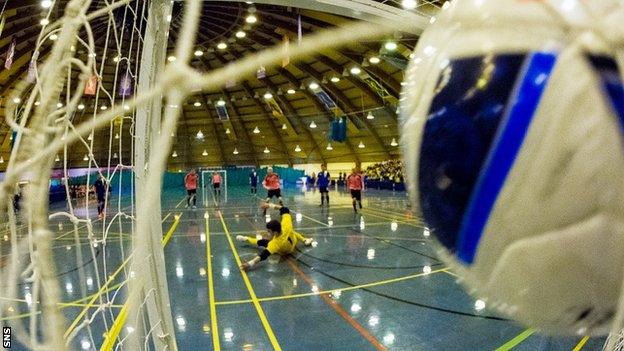Coronavirus: Five prevention tips for five-a-side footballers
- Published

Indoor and outdoor five-a-side football is a popular pastime in Scotland
The coronavirus outbreak has affected football throughout Europe with many games on the continent being played behind closed doors in the next few weeks.
Matches in Scotland are scheduled to go ahead as planned for now but what about advice for people playing football?
The Scottish government's national clinical director, Professor Jason Leitch, joined BBC Radio Scotland's Sportsound to provide tips for five-a-side players.
Five tips for five-a-side
Keep doing it - "One of the biggest protectors against viral disease is exercise; is to be fit and healthy, eat well, run, play football, play basketball, play netball."
If you're sick, don't go - "If you're not well don't go. Don't infect others. Don't go with your mates and give your cold, or in the next few weeks, maybe coronavirus. Don't give that to your mates."
Wash your hands before you go on the pitch
Wash your hands when you come off the pitch - "We're trying to teach people to wash their hands when they reach home, when they leave home; when they come to their work, when they leave their work. If you're doing a transition, wash your hands. Have alcohol gel in the car or the changing rooms."
If you're going to cough or sneeze, do it into your elbow - "That's the safest way of doing it when you're actually playing. Don't do it into your mate's face. If you're out in the pub afterwards or in the changing room afterwards, do it into a paper hanky and discard the paper hanky."
'Large-scale events not at risk - just now'
Professor Leitch says this advice applies "to everybody". "They don't just apply to the five-a-side crowd, they apply to the basketball players or the club runners," he explained.
"There's no panic, there is no need to do anything special. But we think the virus is coming and is going to get worse so we're preparing for what those next things might be.
"The science says that large-scale events are not at risk just now and the science in fact says outdoor large-scale events are particularly not at risk. The virus doesn't tend to live long in that environment. There will be a time where we start to change our advice. We may never stop large-scale events. We will follow the science as it tells us what to do."

Celtic displayed public health advice during Saturday's visit of St Mirren